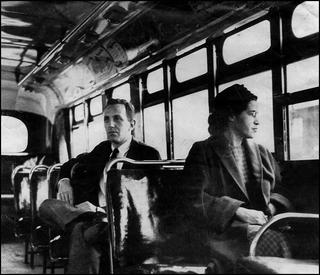Dartmouth celebrates Martin Luther King, Jr. each year with two weeks of programming. One of the activities is a continuous playing of a speech King made at Dartmouth in 1962, "Towards Freedom." You can read the transcript, watch the video, and read about the context for the speech here.
What I like about this speech is that it illustrates just how much King was a realist and an organizer, not just a dreamer. I thought these paragraphs were particularly lucid:
I would like to say first that the federal government must use all of its Constitutional authority to implement the law of the land. There is need for strong, forthright leadership from the federal government. If we look back over the last ten years, we must honestly admit that the kind of consistent, forthright leadership needed this hour has come only from the Judicial branch of the government. The Legislative and Executive branches have been all too silent, apathetic, and sometimes hypocritical. If this problem is to be solved, all branches of the government must work in a consistent, determined manner.
This means that we must get rid of two myths that often linger around. One is the myth of time. There are people who say that the federal government can't do anything about this problem. Only time can solve the problem. I'm sure that this argument continues to move around. There's the idea that if the Negro and his allies in the white community will just be patient and just wait, maybe in a hundred or two hundred years, time will solve the problem. Well the only answer that we have for those who have given themselves to the myth of time is that time is neutral. It can be used either destructively or constructively. At points I think that the people of ill will have used time more effectively than the people of goodwill. It may well be that we who have repented this generation not merely for the vitriolic words and actions of the bad people, but for the appalling silence of the good people, somewhere along the way of life we must come to see that human progress never rolls in on the wheels of inevitability.
Evolution may be true in the biological realm; and at this point Darwin is right. But when a Herbert Spencer seeks to apply to the whole of society, there is very little evidence for it. Human progress is construed of tireless efforts and the persistent work of dedicated individuals. Without this hard work, time itself becomes the ally of the insurgent and primitive forces of irrational emotionalism and social stagnation. We are always challenged to help time and to realize that the time is always right to do right.
There is another myth that tends to linger around and for lack of a better term I call it the myth of educational determinism. It is the idea that only education can solve the problems which we face in human relations, so there is no need to talk about
Executive Orders from the President of the United States or about legislation. It's only through the slow process of education and changing attitudes that this problem will be solved. Well, there's an element of truth in this because education does have a great role to play in changing attitudes. But this is a half-truth. It is not either legislation or education; it is both legislation and education. It may be true that morality cannot be legislated but behavior can be regulated. It may be true that the law cannot make a man love me; religion and education will have to do that. But if it keeps him from lynching me, and I think that's pretty important also.
It may be true that legislation cannot change the heart, but it can restrain the heartless. And this is what we often do through legislation. We must depend on education and religion to change bad internal attitudes, but we need legislation to control the external effects of those bad internal attitudes. So there is a need for civil rights legislation. And it is tragic indeed that in this session of Congress there will be no civil rights legislation. There's also need for Executive Orders from the President of the United States. There is a great deal the president can do with a stroke of the pen.
The speech also contains a thoughtful discussion of nonviolent resistance:
Then the Greek language has another word, the word "agape." Agape is more than aesthetic or romantic love, agape is more than friendship. Agape is understanding, creative, redemptive goodwill for all men. It is an overflowing love which seeks nothing in return. Theologians would say that it is the love of God operating in the human heart. When one arises to love on this level, he loves a person who does an evil deed while hating the deed the person does. And I believe that this kind of love will lead us through this period of transition, this kind of creating, understanding goodwill.
I think this is what Jesus of Nazareth meant when he said, "Love your enemies," and I'm so happy he didn't say, "Like your enemies," because it's pretty difficult to like some people. Like is a sentimental, affectionate sort of thing and it's difficult to like somebody who's bombing your home, and who's threatening your children, and who's throwing you in jail. It's difficult to like some of the senators and congressmen in Washington, the things they're saying about Negroes and members of other minority groups, and some of the things they are doing... It's difficult to like them and to like what they're doing, but Jesus said, "Love them," and love is greater than like. Love is understanding, creative, redemptive goodwill for all men. This is what
nonviolence says. It says that the love ethic is a possibility in the struggle for freedom and human dignity.
Enjoy!
Other blogs commenting on this post
